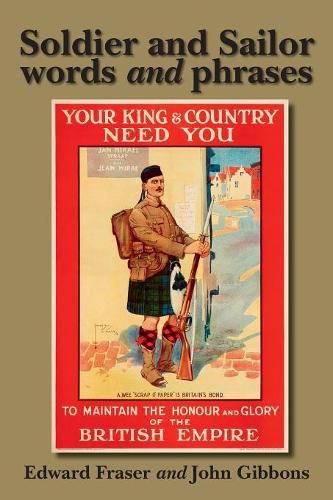Readings Newsletter
Become a Readings Member to make your shopping experience even easier.
Sign in or sign up for free!
You’re not far away from qualifying for FREE standard shipping within Australia
You’ve qualified for FREE standard shipping within Australia
The cart is loading…






This title is printed to order. This book may have been self-published. If so, we cannot guarantee the quality of the content. In the main most books will have gone through the editing process however some may not. We therefore suggest that you be aware of this before ordering this book. If in doubt check either the author or publisher’s details as we are unable to accept any returns unless they are faulty. Please contact us if you have any questions.
This book was first published in 1925 and was intended to be a dictionary of first world war slang. In the 1920s, the war to end all wars was still fresh in everyone’s minds and the authors were commissioned to capture the combatants’ sayings and expressions.
Interestingly, although written nearly fifteen years before the next global conflict, the term first world war appears. Colonel Repington named his published history of the war as such. He did not want to flatter the Boche by calling it the German War so instead chose what became the prescient or perhaps pessimistic first world war .
This book was primarily designed as a Dictionary of War Slang at the instance of the authorities of the Imperial War Museum, using materials contributed by officers and men of all branches of the Service who had served with the British and Dominion forces. A large proportion of the slang of the war, however, comprised old pre-War Army and Navy expressions, which, in the War, were either adopted as they stood, so to speak, or else were altered and adapted to suit existing circumstances, and the enlargement of the original plan became unavoidable. The scope of the work has also been further extended to include a considerable number of Service terms, familiar among people in general, as being of interest in themselves or through their origins.
A number of American service words and expressions, particularly some that became familiar among British troops during the war, have been included.
$9.00 standard shipping within Australia
FREE standard shipping within Australia for orders over $100.00
Express & International shipping calculated at checkout
This title is printed to order. This book may have been self-published. If so, we cannot guarantee the quality of the content. In the main most books will have gone through the editing process however some may not. We therefore suggest that you be aware of this before ordering this book. If in doubt check either the author or publisher’s details as we are unable to accept any returns unless they are faulty. Please contact us if you have any questions.
This book was first published in 1925 and was intended to be a dictionary of first world war slang. In the 1920s, the war to end all wars was still fresh in everyone’s minds and the authors were commissioned to capture the combatants’ sayings and expressions.
Interestingly, although written nearly fifteen years before the next global conflict, the term first world war appears. Colonel Repington named his published history of the war as such. He did not want to flatter the Boche by calling it the German War so instead chose what became the prescient or perhaps pessimistic first world war .
This book was primarily designed as a Dictionary of War Slang at the instance of the authorities of the Imperial War Museum, using materials contributed by officers and men of all branches of the Service who had served with the British and Dominion forces. A large proportion of the slang of the war, however, comprised old pre-War Army and Navy expressions, which, in the War, were either adopted as they stood, so to speak, or else were altered and adapted to suit existing circumstances, and the enlargement of the original plan became unavoidable. The scope of the work has also been further extended to include a considerable number of Service terms, familiar among people in general, as being of interest in themselves or through their origins.
A number of American service words and expressions, particularly some that became familiar among British troops during the war, have been included.